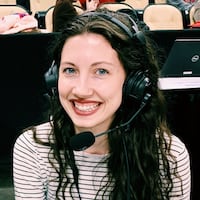It’s a supremely odd, empty time in the sports world.
No NBA, no March Madness, no MLB, no MLS. No anything, really, as experts and leaders across the country encourage "social distancing" as a strategy to limit the spread of the coronavirus. Three NBA players — Utah's Rudy Gobert and Donovan Mitchell and Detroit's Christian Wood — have now tested positive for the virus. Gobert was the first to be diagnosed Wednesday night. The Pistons had played the Jazz four days prior.
In a letter to fans, NBA commissioner Adam Silver announced the league would take "at least" a 30-day hiatus, with the intention "to resume the season, if and when it becomes safe for all concerned." That would put the hypothetical resume date about April 10, though Silver said in a March 12 in interview on TNT that the 30-day time frame is more to give people guidance for when the league will re-evaluate. It's possible, maybe even likely, that the hiatus will stretch on for longer than that.
There are a few scenarios for what to expect, all of which are predicated on something much bigger than basketball: how the country is able to contain the coronavirus in the near future.
Amid all the uncertainty, the league has to take the long-term view, Hawks owner Tony Ressler said.
“The NBA as a business, as a sports league, as a group of 30 franchises, are absolutely committed to taking a long-term view of what’s best for the game, of what’s best for the fan base, what’s best for the players, what’s best for our employees,” Ressler said of his message to Hawks fans while the season is on hiatus. “So the ability to take the long view, I think particularly in an environment like this. ... If you love the NBA, you should expect to see a lot more of it. Maybe not in the next several weeks, maybe not even in the next several months, but you will see a lot more NBA, bigger and better than ever, and that I feel absolutely certain of.”
One scenario could be playing games without fans present — whether with a resumption of the regular season or an abbreviate schedule, going straight to the postseason or even trimming the playoff format. Many places, including California, Ohio and New York have prohibited events with large crowds, so playing without fans could be a reality, if games come back while those rules are still in effect. Atlanta mayor Keisha Lance Bottoms announced that large public gatherings of more than 250 people of more would be prohibited.
On Sunday night, the CDC recommended that for the next eight weeks, people avoid gatherings of 50-plus people, though the new guidance mentions "events of any size should only be continued if they can be carried out with adherence to guidelines for protecting vulnerable populations, hand hygiene and social distancing."
The league is coordinating with infectious disease and public health experts in addition to government officials, Silver wrote in his letter, to determine “safe protocols for resuming our games.” He also mentioned that if games are not played, or must be played without fans in stands, that teams will issue fans either a refund or a credit to a future game.
We’re in uncharted waters, but Silver said in the same TNT interview that it’s a possibility the season won’t continue, though that’s something the league would want to avoid. However, if the season is suspended into the summer, teams could start to encounter scheduling difficulties with arenas.
The NBA suspending play acted as a catalyst for other sports leagues and organizations to follow suit. The Hawks were informed in the fourth quarter of Wednesday's overtime loss to the Knicks that the season was going on hiatus. They are 20-47 with 15 games left to play.
It’s too soon to say exactly what path the NBA will take, and it likely will be that way for a while.
Teams will receive more guidance from the league Monday on what they’re allowed to do. In recent days, they haven’t been permitted to practice as a group.
Although the season’s suspension is difficult to process, it’s a necessary measure for fans, in addition to players, Hawks general manager Travis Schlenk said.
“We’re doing this not for the health and safety of our players, but probably even a larger (group), we’re doing this for the health and safety of our fans,” Schlenk said. “We want to be caretakers for the public, caretakers for the city of Atlanta. So that’s a big driving force behind all this.”
About the Author
Keep Reading
The Latest
Featured

